China Rising
My relaxing time with Bill and Vivien in Shanghai was a nice break from all the travel that I've done in the last nine months. Being on the road for so long has been great, but truly exhausting at the same time. The urge to sleep in the comfort my own bed never gets fulfilled, the desire to savor a delicious Chipotle burrito never comes to pass, and the itch to go out for a night with my friends from home never becomes reality. So, bumming around at my brother and sister-in-law's place in Shanghai is about as close as I've gotten to home in a long time. And it was a very welcome change of pace.
One night, we met up with a big group of Bill's students for a night of dinner and karaoke. The culinary spread at dinner was a whirlwind tour of things I'd never order — pig's hooves, chicken's feet, deep-fried crabs, and blubbery bowls of what looked like pure fat. Luckily, the students went overboard and ordered around thirty dishes, so there was still plenty to eat other than fat and feet. After dinner, we went to a private room at an upscale karaoke bar, where the students immediately got into the singing spirit. Bill's students apparently don't need to be drunk in order to sing in front of people, which was a new concept to me. As Bill's students encouraged the two of us to sing American songs, Bill and I encouraged the bartender to keep the rounds of beer flowing. Eventually, we Nee boys were boozed up enough to sing Hey Jude, Hotel California, and a handful of others to the glee and applause of the sober students.
The riverfront area in Shanghai known as the Bund is a good place to see Shanghai's past and future at the same time. On one side of the river are a collection of historic European and American buildings from Shanghai's days as a booming international trade town during the early 20th century. The Pu Dong New Development Zone lies on the other side of the river, where Shanghai's rapidly evolving skyline climbs up through the morning mist.
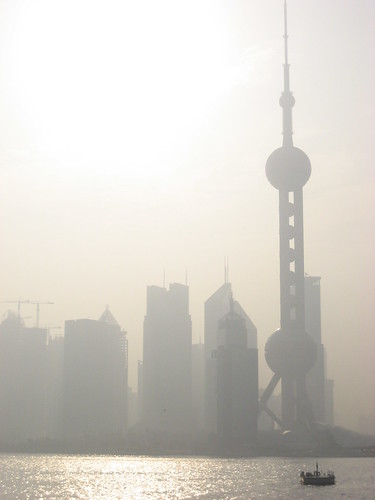
To get to the other side of the river, you can either take a short ride on a colorful and brightly lit "tourist tunnel" for a whopping $12, or you can just jump aboard the subway and go across in normal lighting for a mere 40 cents. As I emerged from the metro station, I found myself in a cluster of newly-built skyscrapers and construction cranes. Some of the buildings were elegant and graceful, and some shockingly ugly, like rejects from the set of The Jetsons, desperately wanting to look futuristic but looking crappy instead. One of the nicest buildings in the area is the current 5th largest building in the world — the Jin Mao Tower, designed by the famous firm Skidmore, Owings, and Merrill. As an architecture enthusiast, I splurged on an $8 ticket to see the views of the city from the 88th floor the tower, which was a great experience. The views of town were epic, and the Chinglish translations describing the building were priceless — one described it as "the first building in China with a surprisingly beautiful appearance." The view from the top down into the 53rd floor of the Grand Hyatt lobby was a really spectacular architectural experience.
photo here (I didn't have my camera)
After a few weeks in Shanghai, I finally said goodbye to Bill and Vivien and made the trip on the posh overnight sleeper train from Shanghai to Beijing, which was like traveling back in time ten years. I arrived in Beijing and was greeted by China's capital city with a deep breath of the polluted air and a trip on the rickety metro system, which was shockingly hard to navigate as an English speaker, which really surprised me given the rapidly approaching 2008 Olympics.
Thanks both to absurd communist city planning as well as preparations for the upcoming games, Beijing is currently a big disaster area, and I spent four days frustrated as hell as I tried to get from place to place on foot. Beijing looks like it was a city designed by giants — each block is painfully huge, and most blocks are occupied by a single enormous landscraper of a building. Walking from one side of the street to the other often requires a 20 minute detour down the block, through a pedestrian underpass, and a walk back up the other side. I've never seen anything quite like it. In other areas, many of the concrete communist structures are getting torn down and rebuilt as kitschy curved-roof shopping streets designed for tourists. One construction fence proudly proclaimed when the building was complete, "all brands will co-exist harmoniously in an ideal ancient streetscape for tourists." As China actively destroys its old hutongs—fascinating old narrow streets full of homes, restaurants and shops—it replaces the old buildings with charmless versions of the same thing. It's hard to properly describe, but it almost seems like China is in the act of self-Disneylandification, ignoring its actual culture in favor of a newer and more slick version of itself.
Curiosity brought me out on a bus to the Olympic area in Beijing's blocky suburbs to check out the venue construction. I had seen a rendering of the new national stadium designed by Swiss firm Herzog and De Meuron, and I wasn't sure what to think of the bizarre bird's nest design, but once I got out there and saw the massive building in real life, I thought it was really amazing. Here's a shot of the construction site, followed by one of the scruffy construction guys who are building it:
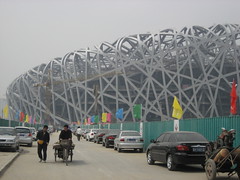
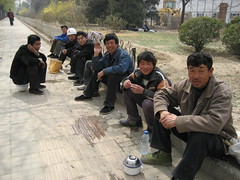
Despite my complaints about the city planning and complete disregard for historic preservation, Beijing definitely redeemed itself with three of the best attractions on the planet: The Temple of Heaven, the Forbidden City, and the Great Wall.
The gorgeous Temple of Heaven dates from the Ming Dynasty and is set in a pleasant park where people come to watch old people perform traditional Chinese music, or just relax in the park's peaceful atmosphere. I visited the temple five years ago with my parents on my first trip to China, and I went back because I really love the timeless elegance of the building.
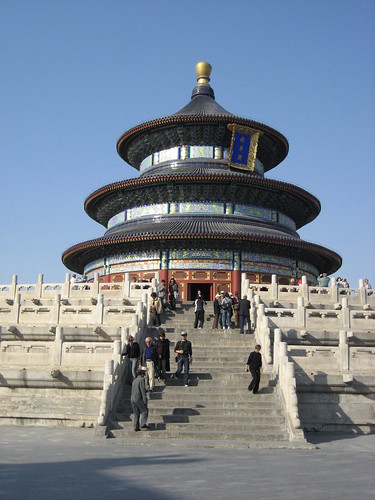
The next day, I passed under the massive portrait of Chairman Mao and spent all day exploring the Forbidden City, an dauntingly massive series of temples, palaces, gardens and imperial buildings packed into 178 acres in the center of Beijing. Like much of the rest of Beijing, it was under heavy renovation, but I still had trouble making my way through the parts that were currently open. The Forbidden City is seriously enormous, and it would take weeks to fully explore it.
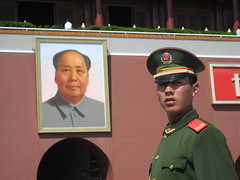
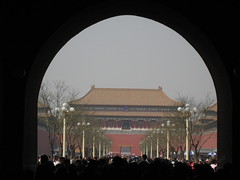
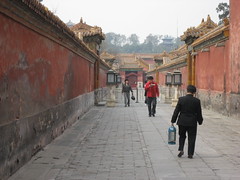
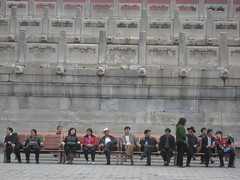
The following day, I decided to go on my hostel's "Secret Wall Tour," which takes visitors out to an unrestored stretch of the Great Wall of China. Normally I don't head out on gimmicky-sounding tours, but it got rave reviews from other people at the hostel, and it turned out to be really amazing. After a few hour drive into the mountains, our minibus driver dropped us off out in the middle of nowhere, and we were told to follow an old man dressed in an equally old blue Mao suit. Our elderly guide didn't speak any English, but he was absurdly charming as he took care of our group and led us on a few hour hike along the crumbling stretch of the wall. I had seen a restored section of the wall with my parents, so I'm really glad I got to see one that was still in disrepair and off the tourist map, for now. Plus, our guide was priceless:
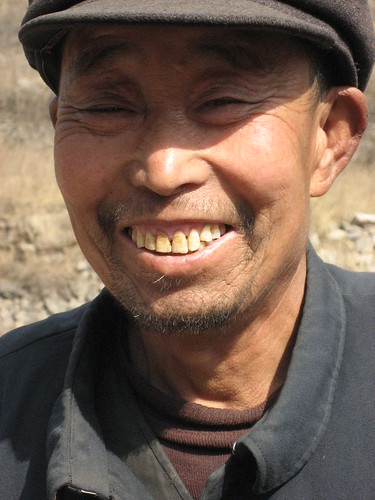
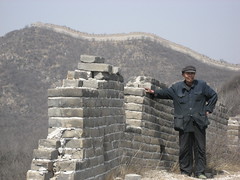
As I was preparing to leave Beijing, I started to wonder whether the Olympics will be a good thing for the country. China wants and deserves to be in the spotlight right now, but I don't think the government is really prepared for how bright the spotlight will be. China has a very closed media system and no free press, and I'm not sure if the government realizes that the Olympics will be the most widely-covered event so far in the history of man. Think about it: never before have people been able to transmit information as quickly to one another as we can today. A protest on Tiananmen Square calling for freedom in Tibet, for example, could be instantly broadcast in the form of video, photos, text messages, and blogs via mobile phones, laptops, and cameras directly to the Internet as it is happening. Imagine if that was the case during the student protests in 1989: instead of one video of a student standing in front of a row of tanks you'd have a few thousand, all flying around the web instantly. China has been struggling to control the media as the Internet starts to push them to open things up, and by the time Olympics roll around, the effort seems like it will be futile. For more on this, check out this article about the Government's pre-Olympics anti-spitting campaign. I personally think people will be more turned-off by not being able to access Wikipedia, read Time Magazine, or update and read their blog while in China than they will be by the spitting. Anyway, in my experience, Chinese people are really proud of their culture and country, and on one hand I hope the cynical West won't come in and crash the party. On the other hand, I do think that something needs to be done about Tibet, the lack of free speech and press, and other issues which will certainly be raised in 2008. Needless to say, it will be a very interesting Olympics, where more will be on the playing field than just sports.
Side note: I just laughed out loud as I wrote that last sentence, which I admit is a bit ludicrous. Sometimes when I'm writing this blog I feel like I'm a crappy journalist for some small town (or worse, high school) newspaper. But for the sake of self-documentation, I'm trying to write about the things that I'm thinking about in addition to the things I'm doing, even if my reasoning is totally off-base and flawed. After I offended the Indian guys by my post a few months ago, part of me felt like I should be more careful about what I say here, but I feel like doing that will ultimately make the journal less interesting for people to read, and for me in the future as well. Alright, on with the blog!
I left Beijing early in the morning on the famous Trans-Siberian Railway. Actually, the official name is Trans-Mongolian Railway, and it is one of three epic train rides that goes across Siberia to Moscow from Asia. I boarded the train one morning and settled in for what is one of the longest railway journeys on the face of the earth.
With six full days to spend on the train, there was plenty of time to get to know my fellow passengers. There was Jack, a fascinating 84-year-old man who is traveling by train from Hong Kong all the way back to his home in Southwest England by train. He told me a lot of incredible stories from his life, including tales of fighting the Nazis in World War II. There was also Ryan, a Canadian guy who has spent the last 18 months slowly working his way around the world overland, getting across the ocean by working as a crew member on container ships and yachts. There was also Mike, a John Elway lookalike from Maryland who has been partying his way across the world on a break from his job as a navigator on a 300-meter long (three football fields) merchant marine container ship. There was also Graham and J, a fifty-something couple from New Zealand who decided to sell everything they own and live out of suitcases for the rest of their lives. Finally, there was Aaron and Ryan, two fun guys from Kansas who spent the bulk of the past year weaving around the world traveling both solo and with other friends, collecting incredible stories along the way.
Nobody in my 4-bed compartment spoke any English, but I kept the wacky Chinese women entertained with my hand motions and antics. The women didn't seem to understand that I didn't speak Chinese, because the full six days were spent with them saying something to me in Chinese, and then they'd repeat the same statement louder as if I'd suddenly know Chinese if they yelled into my ear. Our conversations generally went something like this:
Them: blah blah blah blah blah
Me: In case you forgot, I don't speak Chinese.
Them: BLAH BLAH BLAH! BLAH BLAH BLAH!
Me: I remain unable to speak Chinese.
Them: (look at each other thinking: This guy is an idiot.)
Despite the language barrier, the women were really likable and we had a fun time over the course of the trip. Plus, one of the women was a professional massage therapist, so she gave me free hour-long professional massages every day, which were amazing despite the lady thoroughly massaging my ears every time, which was as creepy as you'd expect.
At the end of the first day on the train, we had made it to the China-Mongolia border, where we went through customs and the train was broken apart and each car was lifted individually by massive hydraulic lifts to adjust the tracks to fit Mongolian (and Russian) train gauges. The coolest part is that they lifted each train car with everyone still inside. Here is a crew member sliding the new tracks in place:
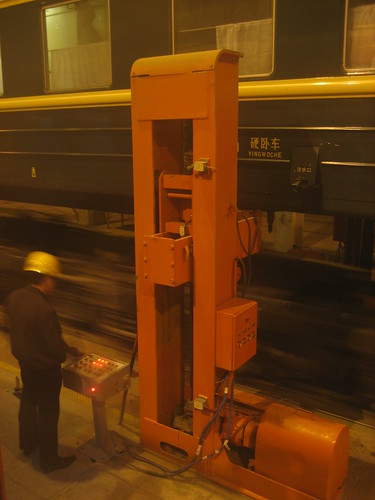
We spent all of the next day cutting north through the vast emptiness of the Gobi Desert and the rest of Mongolia, the most sparsely populated country on earth. From the train, we'd occasionally catch glimpses of clusters of gers (Mongolian nomad tents), sheep grazing in the distance, or the occasional vehicle speeding along next to the train, but for the most part Mongolia seemed completely empty. In the afternoon we arrived in the suburbs of the capital city Ulaanbaatar, which I found fascinating because they looked like suburbs in America with gers instead of cookie-cutter houses. From the train, downtown Ulaanbataar looked like a dusty wild west town overtaken by soviet architects. Someday I'd like to go back and really explore Mongolia, but for now I had to settle on seeing it pass outside the train window.
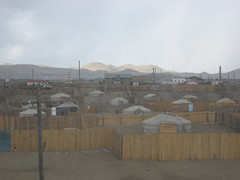
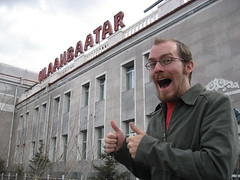
At the end of the second day, crossed the border into Russia, which was a bit nerve wracking because the Russian cops are notorious for scamming tourists out of massive quantities of money. As we crossed, the guards did a fair bit of stomping around, shouting orders, and shuffling through my luggage, but I managed to sneak through incident-free. The elderly British woman the next compartment over was not so lucky: because of a mixup at the consulate, she didn't have a valid Russian visa and they made her leave the train and go back to Ulaan Bataar, costing her thousands of dollars in missed transit connections because of the delay.
The following day, we spent the majority of the morning chugging along next to the beautiful waters of Lake Baikal, which was so big it looked like a frozen ocean. I sat there as we moved along the lake between the towns of Ulan Ude and Irkutsk with a big smile on my face, enjoying the surreal view.
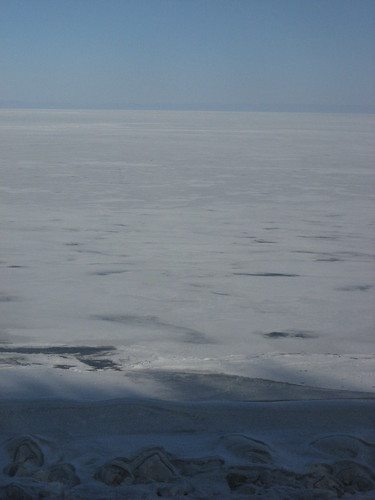
The next three days were spent on an epic push westward through quaint Siberian villages and blocky communist factory towns. Time passed fairly quickly as I read, listened to music, or played cards and drank with my friends on the train. My favorite part was the seemingly endless sunset every night as we followed it toward the horizon. On the fifth day, we crossed the Ural Mountains and officially entered Europe. On the last day we made the final crawl through the suburbs and finally arrived in Moscow.
The first thing I noticed in the city was the bizarre fashion sense most Muscovites seem to have. Most girls my age walk around wearing leather miniskirts, tiny fur coats, and liberally applied makeup as if they're headed off to some party with a 1980s prostitute theme. The surly and burly guys have an equally odd choice in clothing — the other day I saw a guy walking down the street wearing rhinestone jeans, a purple sweater, and leather vest, and sporting a rat tail and a moustache. The strangest part is that he looked at me like I was the fashion disaster.
Fashion aside, I was surprised at how European the city seemed to be. I was expecting it to be a somewhat dreary place, but I was pleasantly surprised to see how little soviet architecture there was in the city center. Parts of it made me feel like I was walking around in Prague or something, with lots of pastel-colored buildings shining down onto the scowling Moscovites below. After checking into an excellent-yet-expensive hostel in the city center, I headed out for a wander around Red Square, located only a few blocks from my place. The first thing I saw as I finally entered the square was the quirky and colorful domes of St. Basil's Cathedral.
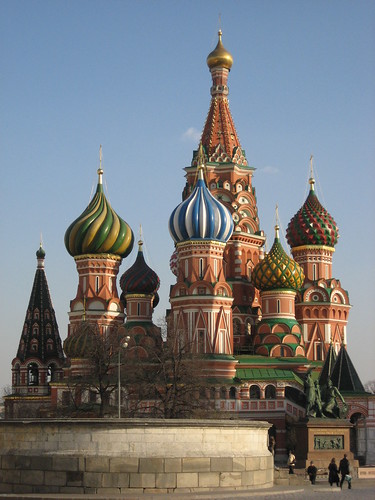
As I predicted, Moscow is absurdly expensive. I paid $27 per night for a bed in a dorm room, and meals are costing me an absolute fortune. For the same price of a multi-course meal back in Asia, all you can get in Moscow is a saltine cracker with ketchup on on it. Okay, that was a little bit overdramatic, but it's unfortunately not far from the truth. I've geared down to two meals per day, and I'm still running about 30 dollars over my maximum daily budget. Apparently Moscow passed Tokyo in 2006 to become the most expensive city on earth. After visiting, I definitely believe it.
My second day in town, I went out with Chelsea and Paul, two friends I met at the hostel to check out the sights at the Kremlin. Our first stop was to see the Lenin Mosoleum, where visitors can shuffle past his disturbingly well-preserved body for a few seconds as the stern guards ensure visitors keep a brisk pace. Oddly enough, his brain was removed by Stalin in order to get a detailed analysis of the genius communist brain. Our next stop was the Kremlin's Armory, which houses a glittery museum full of a few thousand pieces of royal regalia, ranging from thrones and crowns to old gilded bibles and Fabrege eggs. The descriptions were in Cyrillic only and I've never been terribly into shiny gold trinkets, but it was fairly interesting anyway. Next, we went into the Kremlin, which is home to controversial Russian President Vladamir Putin, a handful of churches, a nice park, and a few other government buildings. For dinner, we went to a place called Moo-Moo, which serves (relatively) cheap Russian food, and I was very surprised to find that I really like Borsht, the famous Russian radish-based soup that I assumed only poor people ate. After that, we went back to the hostel for a night of heavy drinking and chatting until dawn.
Here's a shot of a statue nearby the Kremlin's walls and opposite Red Square:
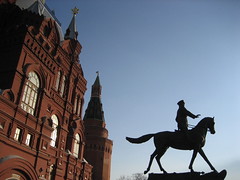
I spent another day in Moscow visiting the Museum of Private Collections, which is full of artwork donated to the museum and kept in groups according to the person who donated it. The museum was completely different than any I've ever visited, because it divided art based upon one donor's tastes over their lifetime rather than by time period, art movement, or theme. Each room represented a chunk of a different donor's collection, and provided a biography of each person, giving insight into the nature of each collector based on their tastes in art. How does a historian's taste differ from an artist's or an engineer's? What drives people to collect art in the first place? I never really thought about these things before, but the Private Collections Museum brought these questions to light in an unavoidable way. On a museum high from such a cool place, I headed across the street to check out the Pushkin Gallery, which houses an incredible collection of work by European and North American heavy-hitters from the 19th and 20th century. On display were a slew of awesome pieces by Degas, Manet, Rodin, Pissaro, Renoir, Leger, Monet, Talouse-Lautrec, Van Gogh, Rodin, and Picasso. I left both museums feeling inspired.
I left Moscow last night on a sketchy-but-cheap overnight train and I'm now in St. Petersburg, home of even more epic artwork. I'm off to Berlin in a few days to celebrate my 24th birthday on April 27th with my parents, who are flying out and joining me for a tour through Central and Western Europe including Prague, Krakow, Paris and London! I'm ridiculously excited.
Ryan
2 Comments:
Hi Ryan,
I didn't read this blog yet. but I saw you in front of Ulaanbaatar, that is one of my favorite spots on my world map shower curtain.
You will be pleased to know that waiting for you at home are Jake's breakfast burritos. Parry and I found the whole Jake's crew inconspicuously carrying on the Jake's tradition of cheap deliciousness at "Shorty Lu's" on Old Golden Road. I think they've been there this whole time.
It's like a spiritual rebirth.
Hope you're having fun, I leave for la ciudad May 13. bye
Herro Ree,
Dude! Are you saying there's a return of the Papos Deluxe? That was probably the greatest meal ever invented. Too bad those rascals didn't pay their taxes for 10 years or whatever.
May 13th? Whoa. Are you going to blog about it or what?
Post a Comment
<< Home